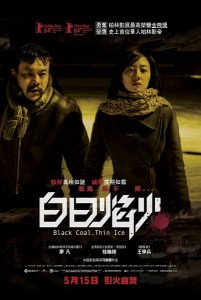Black Coal, Thin Ice
白日焰火
China/Hong Kong, 2014, colour, 1.85:1, 109 mins.
Director: Diao Yi’nan 刁亦男.
Rating: 6/10.
Interesting but not fully realised whodunit set in wintry northeast China.
A town in Heilongjiang province, northeast China, 1999. The bodyparts of a murdered man are found scattered within a 100-kilometre radius, and the victim is identified by an identity card as Liang Zhijun (Wang Xuebing), who worked in a local coal plant. Liang Zhijun’s wife, Wu Zhizhen (Gui Lunmei), works at a small dry-cleaning shop run by He Mingrong (Wang Jingchun), who is attracted to her. Detective Zhang Zili (Liao Fan), who has just been through a painful divorce from his wife (Ni Jingyang), identifies two coal workers, brothers Liu Fayin (Luo Cheng) and Liu Faxing (Pei Gongyong), as suspects. During their arrest, a gun battle breaks out and both brothers, plus two detectives, die; Zhang Zili is wounded. Five  years later, Zhang Zili is working as a security guard at a factory. Still traumatised by what happened back in 1999, he’s drinking heavily. His former colleague, Wang (Yu Ailei), approaches him with details of two recent murders which bear a similarity to the original case and whose victims, both found wearing ice skates, also knew Wu Zhizhen. Zhang Zili decides to privately investigate and follows Wu Zhizhen around. She warns him off but he perseveres, and she finally agrees to go ice-skating with him. Wang follows them and tries to warn Zhang Zili not to become too emotionally involved with Wu Zhizhen. Meanwhile, Wang is murdered by Liang Zhijun, who is in fact still alive. Zhang Zili later follows Liang Zhijun and sees him disposing of Wang’s bodyparts, but fails to apprehend him. The police question Wu Zhizhen, but the case is not over yet by a long mark.
years later, Zhang Zili is working as a security guard at a factory. Still traumatised by what happened back in 1999, he’s drinking heavily. His former colleague, Wang (Yu Ailei), approaches him with details of two recent murders which bear a similarity to the original case and whose victims, both found wearing ice skates, also knew Wu Zhizhen. Zhang Zili decides to privately investigate and follows Wu Zhizhen around. She warns him off but he perseveres, and she finally agrees to go ice-skating with him. Wang follows them and tries to warn Zhang Zili not to become too emotionally involved with Wu Zhizhen. Meanwhile, Wang is murdered by Liang Zhijun, who is in fact still alive. Zhang Zili later follows Liang Zhijun and sees him disposing of Wang’s bodyparts, but fails to apprehend him. The police question Wu Zhizhen, but the case is not over yet by a long mark.
REVIEW
Six years after his second feature, the minimalist-mannerist drama Night Train 夜车 (2007), Mainland writer-director Diao Yi’nan 刁亦男 strikes out in a more rewarding direction with his third movie, Black Coal, Thin Ice 白日焰火, an atmospheric serial-killer mystery that’s part genre spin and part stylised psychodrama. Largely set during a bone-freezing winter in northeast China – captured with great veracity by Diao’s regular d.p. Dong Jinsong 董劲松 – it’s a frustrating mixture of impressive moments and misplaced auteurist flourishes that doesn’t fully realise its potential. Diao has commendably aimed high here but his script is not equal to the challenge he’s set himself.
The whodunit is a challenging enough genre on its own, with rules that can be broken only by very skilled writers. As bodyparts continue to turn up throughout Heilongjiang province, five years after a horrific similar murder, the movie pairs a psychologically damaged former detective with a young woman who may or may not be a Black Widow serial killer. As the ex-cop becomes obsessed with her, the truth is far more complicated than it seems at first glance. It’s classic noir material – here played out in an average, shabby coal-mining town in the depths of winter – but with its episodic construction and sometimes confusing plot lacunae the film doesn’t build up a real head of steam as a crime mystery nor enough sustained psychological drama to carry the viewer through the twists and turns. In the final scenes, in which the double-stranded plot should resolve itself satisfyingly, the movie just seems to dribble away and end on a shrug.
Despite all that, performances by the largely Mainland cast are good, within the limitations of Diao’s script and direction. In a relatively rare leading role, Liao Fan 廖凡 (the ex-con in Ocean Flame 一半海水一半火焰, 2008, the impoverished boyfriend in Love on Credit 幸福额度, 2011) is engaging as the gruff, burned-out ex-cop who sees a chance to redeem himself professionally and emotionally via the case, and supporting roles – especially Yu Ailei 余皑磊 as his detective friend and Wang Jingchun 王景春 as a shifty laundry owner – all have an authentic ring as tough, taciturn northeasterners. Wang Xuebing 王学兵 (the spymaster in The Silent War 听风者, 2012) pops up in the later stages in a smallish role.
But as a key to the whole drama, actress Gui Lunmei 桂纶镁 (Parking 停车, 2008; The Stool Pigeon 线人, 2010; Gf*Bf 女朋友 男朋友, 2012) looks, through no fault of her own, as if she’s been beamed in from another movie: her soulful, serene beauty seems out of place in the grim urban landscape and, though she largely suppresses her natural Taiwan accent, her character never seems rooted in the setting in the way the others are. This wouldn’t matter if the role was more fully developed by the screenplay; but for most of the movie she’s just a passive character, neither grieving widow nor femme fatale, with hardly any dialogue to work with until the latter stages. It’s that challenge – creating a sense of mystery without sacrificing character – that Diao’s script doesn’t meet, and which is typified by its handling of Gui’s role. [The part was originally offered to actress Gong Li 巩俐.]
On the plus side, the movie has flashes of wry humour that recall Diao’s interesting first feature, Uniform 制服 (2003), and keeps the audience on its toes with sudden reversals (an unexpected shootout in an entertainment parlour, a vicious alleyway murder). However, other switches in tone are distracting and borderline silly: a clumsy grope on a platform by Liao’s cop, a later grope on a Ferris wheel that looks like a bizarre nod to [British noir classic] The Third Man (1949), and a weird bathtub scene by a nightclub owner. These could easily be discarded, to the film’s advantage. [Some of these weaknesses were corrected in the 106-minute, re-edited version released in China a month after the film’s Berlin festival premiere.]
On a technical side, the film is fine, with Diao conveying setting in a much more subtle way than in Night Train. Dong’s unshowy photography of the wintry urban landscape – all industrial plants, shabby backstreets and frozen ice rinks – is speckled with warmer pools of coloured light, and the whole thickly-clothed way of life is shown with absolute authenticity. The original Chinese title means “Daytime Fireworks”.
CREDITS
Presented by Omnijoi Media (CN), Boneyard Entertainment China (HK), China Film (CN). Produced by Jiangsu Omnijoi Movie (CN).
Script: Diao Yi’nan. Photography: Dong Jinsong. Editor: Yang Hongyu. Music: Wen Zi. Art direction: Liu Qiang. Styling: Yang Hong. Costume design: Yang Junyi. Sound: Zhang Yang, Li Danfeng. Action: Luo Cheng. Visual effects: Adonglin.
Cast: Liao Fan (Zhang Zili), Gui Lunmei (Wu Zhizhen), Wang Xuebing (Liang Zhijun, Wu Zhizhen’s husband), Wang Jingchun (He Mingrong, the laundry owner), Yu Ailei (Wang, police captain), Ni Jingyang (Su Lijuan), Chang Kaining (Zhao Jianping), Li Caixia (San), Li Kewei (Liu, police captain), Luo Cheng (Liu Fayin), Pei Gongyong (Liu Faxing), Peng Long (Bianyi), Yu Xuedong (Xueyi), Jiang Yanliang (Qiangjun).
Premiere: Berlin Film Festival (Competition), 12 Feb 2014.
Release: China, 21 Mar 2014; Hong Kong, 15 May 2014.
(Review originally published on Film Business Asia, 14 Feb 2014.)
